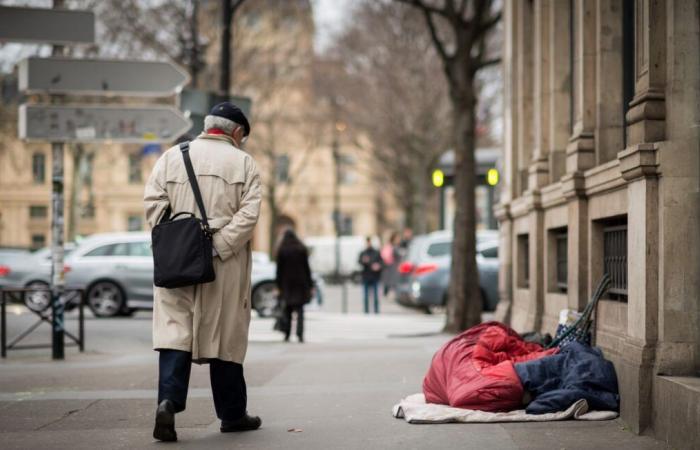This first weekend in November marks, like every year, the start of the winter break, this period which extends until March 31 and during which the eviction of the tenant from their accommodation cannot take place. But if it protects tenants in difficulty, the winter break can do nothing for those who are already suffering from poor housing or living on the street.
However, according to an INSEE study, 3.1 million homes in France were vacant in 2023. In Paris alone, there would be 100,000, or one in five homes. Enough to find solutions for those who do not have a roof over their heads. This is what pushed Jacques Baudrier, Anne Hidalgo's deputy in charge of housing, to make a specific request in an X thread a few days ago: Ask the government for the right to requisition vacant housing.
A state right since World War II
Well, more precisely, a transfer of skills. Because the right of requisition is not new and has existed since after World War II. Set up by General de Gaulle, it allowed the State, via a requisition order, to use thousands of homes left vacant by the war. Except that since then, it has only been used on very, very rare occasions, including the most recent ones, by Jacques Chirac in 1995 and Lionel Jospin in 2001.
“A question of common sense” to combat poor housing
But this right of requisition is the business of the State alone, and in particular that of its representatives in the departments, the prefects. “What I am asking is that this competence be transferred to the municipalities,” explains Jacques Baudrier, contacted by 20 Minutes. In the same vein as the rent control, applied in Paris, he would like requisitioning powers to be allocated to Paris town hall with the aim of relieving the housing market, which is extremely tense in the capital.
In this, he is supported by his predecessor in the task, and now senator from Paris, Ian Brossat: “It’s a question of common sense. There is an absurdity in seeing so many people on the street while 20% of housing in Paris is empty,” explains the elected communist who was still in charge of housing in Paris a year ago, who also cites all the areas in tension in France, including tourist areas such as the Basque Country, the Côte d'Azur, or the coast of Brittany.
A very complex right to apply
So should we expect to see bailiffs or agents breaking down the doors of vacant homes and second homes to accommodate all those in need? The owners most concerned can breathe: the answer is no.
“There is no question here of wanting to take the empty apartment which is in a co-ownership,” explains Ian Brossat. The goal is first to target large buildings and complexes, such as old hospitals or schools which are no longer occupied.” Premises which have not been occupied for at least two years as required by law, and which, individually, could provide a large housing space.
Because if it exists, the right of requisition by the State remains complex in application as Céline Benoliel, a lawyer specializing in housing law, explains to us: “The right of requisition clashes with the right to property which, in the Constitution , is superior to him. » To summarize, the right to property takes precedence over the right to housing in French law. “There really has to be a very strong need for general interest to be able to apply a requisition,” adds Céline Benoliel.
Nine million people without housing
According to the lawyer, “the rare times when the general interest was able to take precedence over property rights concerned damage to private property caused by public works, subdivision plans, or even the municipality's right of pre-emption, and expropriation due to declaration of public utility.” Suffice to say that it was not a question of seizing private property to house a homeless family.
Above all, if the idea may seem logical given the vacant housing in France and the 9 million people without housing, it comes up against the complexity of the procedure and reality, as explained by Amandine Labro, lawyer at the Paris bar. : “These are very cumbersome procedures and are closely regulated by the construction and housing code. Given the number of homes affected, attention must be paid to procedural defects and the cost that this may entail. »
Beware of abuse
Thus according to this expert, France has the legal arsenal to fight against poor housing and “all levers are good to take” but it depends “where we put the cursor”: “There is a difference between hitting multi-owners , big fortunes like Bernard Arnault as part of the national solidarity effort that is requested, and hit the small owner who inherited a small country house that he does not occupy or the retired couple who invested in a studio to rent it out and ensure his retirement. »
“We must not crystallize existing tensions with thermal standards, squats, unpaid rent, etc. which discourage owners from renting,” adds Amandine Labro, who warns against abuses that could arise from requisition.
Preaching the worst to obtain a tax increase
Abuses that Jacques Baudrier defends against, who sees the requisition of housing as more of a threat than the response to poor housing: “We know very well that requisition is not the great solution to poor housing and the shortage of habitat. In reality, we favor an increase in taxation, a three-fold increase, on vacant housing and second homes to encourage owners to put them on the rental market. »
“We are prioritizing the increase in taxation which is a real weapon against these multi-owners who do not put vacant housing on the market because they do not need it financially. But we wish to obtain the power of requisition in order to pose a threat to those who do not want to vacate these accommodations. » A proposal which could make noise in the middle of discussion on the draft Finance Law in the National Assembly and for which the different parties could come together as shown by the amendment tabled by the Macronist deputy, Lionel Causse, to this effect .






